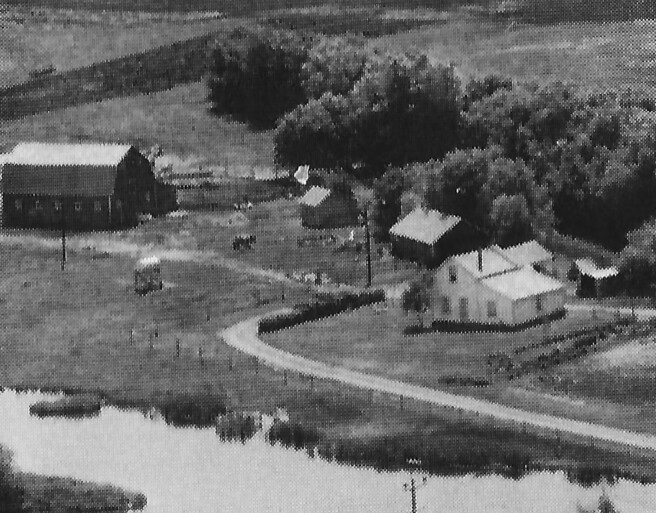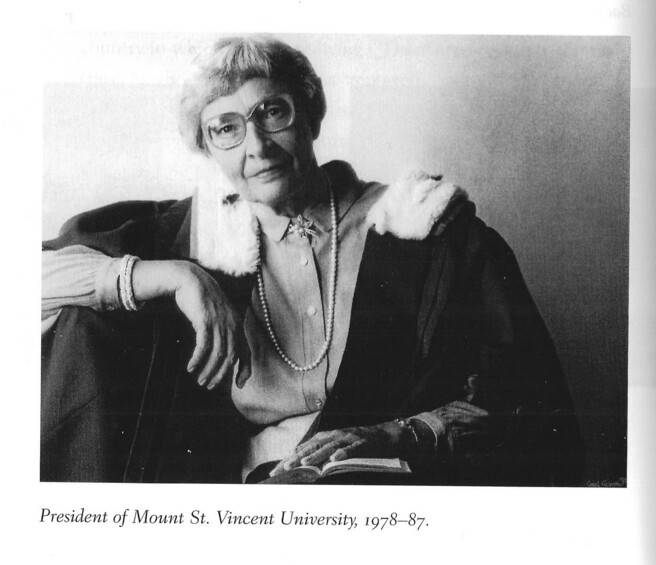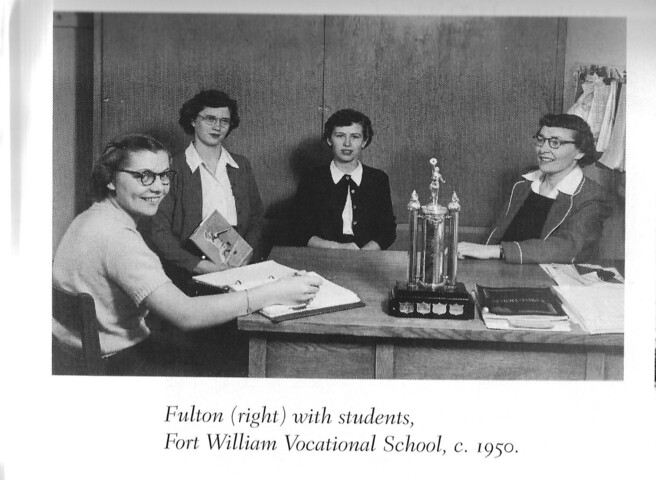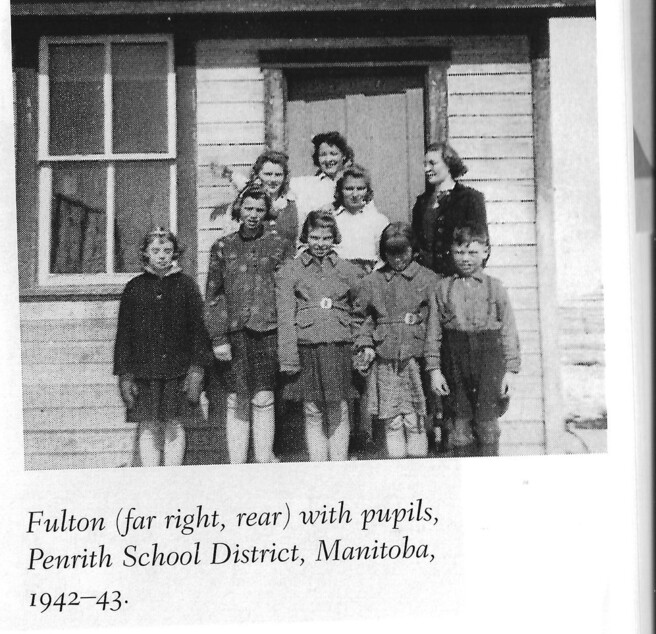Celebration of a Life
(Eulogy as presented by Sheldon Fulton at Service for Margaret on February 8th at Salt Spring United Church)
When first asked by the Family to give the eulogy today I originally thought - I have to be the luckiest person here today – I get to say a few words on behalf of my Aunt Peggy – in front of her friends and family – what an honour. But then a few doubts started to creep in – can I really do justice to this great lady? – can I convey how much we enjoyed having her in our life and how much we will miss her…we’ll see...
My acquaintance with Aunt Peggy, and she will always be Aunt Peggy to me, was as one of the 17 nephews and 7 nieces that she adopted as her family. So I got to see her from the family side – through Christmases, reunions, weddings and more recently, visits to Salt Spring.
But as the speaker for this celebration of her life, I thought it important to examine the other sides of Aunt Peg – her career as an educator, her lifelong friendships, and her many successes – so I took to the internet to learn more about what made Aunt Peg great – and my fears at doing justice to Aunt Peggy were magnified – she was indeed a great lady and a great Canadian.
I took to re-reading James Doyle’s biography of Aunt Peg – Transformations - to get a sense of the many influences on Aunt Peg through her 90 plus years. It became apparent that Aunt Peg was one of those rare people that was shaped by her early days and by her career as an educator but was able to leave lasting impressions on all who had the opportunity to meet her.
Influences - Let me illustrate with the attributed quote from her obituary on her ability to speak publicly:
“For the first time I had the power of speech – I saw what could be done with words, for I had a vision of a new world as I talked.”
This sounded like Aunt Peg. But on re-reading the Transformations biography I found that this quote was not Aunt Peg’s but actually from Nellie McClung – one of her inspirations – and a woman with many parallels – Nellie McClung grew up in Manitou a town southeast of Brandon as far as Birtle is northwest of Brandon. She later achieved noticeable fame after moving to Alberta as we shall see again when their circles crossed once more.
Influences –the writings and achievements of Nellie McClung were introduced to Peggy by her mother an avid reader with incisive commentary on the opportunity differences between men and women. Aunt Peg was a product of the late 1920’s and 1930’s in rural western Canada. A time of rural populism, co-operative action and a great respect for the power of Mother Nature.
Nellie McClung also started as a schoolteacher in rural Manitoba as she wrote and spoke of the need for equality for women. It was after giving her first speech in 1907 at a province-wide meeting of the Women’s Christian Temperance Union in Manitou - her later recollections were:
“It is quite likely that there is no person who remembers that speech, but I remember it. I remember the effect it had on me. For the first time I knew I had the power of speech. I saw faces brighten, eyes glisten, and felt the atmosphere crackle with a new power. I saw what could be done with words, for I had the vision of a new world as I talked.
I was like a traveler who sees through the mist the towers of the great city. It was not ideas I was giving them exactly, but rather ferments - something which I hoped would work like yeast in their minds.”
On hearing these words it is not difficult to understand the influence of McClung on Aunt Peg and why it was mistakenly attributed.
‘Yeast in their minds.’
This invoked one of my earliest recollections of Aunt Peg. I was seven or eight at the time and we were having Christmas supper at Uncle Lockie’s. A great tradition to share Christmas with extended family, Mother would reciprocate with New Year’s at our place.
Just as we sat down to enjoy our turkey, Aunt Peg came in after an afternoon visit with Uncle Harvey, Aunt Millie, Pop and Gram. She was on the Christmas Break from her teaching position in Fort William and in her boisterous way she wished Merry Christmas to all and promise of a surprise after supper.
Well we all waited with apprehension for what was to come and after Aunt Nellie’s Christmas pudding Aunt Peg gets up goes to the kitchen and retrieves a bag of gifts – this female Santa Claus was playing havoc with my preconceived notion of male roles – however she walked around the table and to each of her seven nephews and nieces – Jennifer was too young and Abigail was still to come, she gave a book acquired in Fort William to each of us – that was reflective of her view of our identity.
I later learned that she did much the same for all her sibling’s families she visited in Birtle. Imagine taking the time to not only remember her 20 or so nephews and nieces but to select reading material that she thought was appropriate for these young minds.
I have often wondered what would have happened if she gave brother David my book on science and mathematics, and given me David’s book on space travel. Maybe all my kids would be pilots with WestJet.
It is really difficult getting a full grasp on the enormity of Aunt Peg’s achievements and the barriers faced along the way. Let me relate a little episode that reflects how Aunt Peg integrated family, work and education. It was in 1965 when she was working on her PhD at the University of Toronto, and I had been fortunate enough to be selected as a Grade 11 student to travel to Toronto as part of the pre-100th Confederation Celebrations across Canada.
This was quite an experience for a 16 year old from the farm to visit the ‘Big City’ – the Centre of the Universe as I was later to discover. On departing I was instructed by Mother to make sure I contacted Aunt Peg while in Toronto and given a phone number at the University of Toronto. Well for a naïve farm boy not yet experienced with the “hierarchical structures” of Canada’s Universities – I just dialed the number and asked for Aunt Peg - then paused, err’d and said I mean Professor Margaret Fulton. Aunt Peg’s assistant quickly and cheerfully responded – oh you must be one of the nephews she will be happy to hear from you - just a minute…
Well I got the grand tour of the U of T with a history lesson on its obstacles for women’s advancement in this storied institution – as we walked past Hart House and Massey College both financed by the Massey family – I queried Aunt Peg - a little in awe - if this was the Massey in Massey Harris – tractors – combines - and the former Governor General in the 1950’s – remember I was just a farm-boy in the big city…
To which Aunt Peg responded with indignation Yes – and did you know Sheldon that Hart House is the student centre for the University – but women students are not allowed access – and as we passed Massey College she pointed to the side door and said with increased indignation – that’s the women’s entrance – my first experience with female discrimination and the walls that Aunt Peg would later help tear down…
Hard to believe that such a famed Canadian as Vincent Massey could be part of such discrimination:
Massey's donation for Hart Hall, the university student centre stipulated that the building was to be used only by men, as he felt that a coeducational facility would ruin the sense of collegiality that he hoped to create. Beginning in the 1950s, this restriction created much controversy as women demanded admission.
Since 1972, women have been able to fully participate in the House's activities but you sort of get the sense of how this would affect Aunt Peg. And just so you get some idea of Aunt Peg’s political leanings let me add one further excerpt on Hart House:
During John F. Kennedy's debate with Stephen Lewis at Hart House in November, 1957, Kennedy said "I personally rather approve of keeping women out of these places" and went further onto remark "It’s a pleasure to be in a country where women cannot mix in everywhere".
Back to Aunt Peg and her studies and influences: It was sort of known that Aunt Peg was writing her thesis on one of the Victorian authors - Thomas Carlyle – well to the science leaning nephews and nieces this was not a name fresh from the tongue.
Some writer from the 1800’s in England and rumour was that Aunt Peg actually wanted to do research on his wife Jane Carlyle- but those bastions of male relevance at the U of T said no – it has to be the man…
So Aunt Peg took the round-about and researched his Essays – many influenced by Carlyle’s wife. But who the heck is Thomas Carlyle and why was Aunt Peg doing her thesis on this Victorian Scottish philosopher… So back to the source of all knowledge (Wikipedia) and let me give just one passage:
Carlyle was one of the very few philosophers who witnessed the industrial revolution but still kept a transcendental non-materialistic view of the world…
Starting to make sense now – then I read a few of the quotes from his book - “Hero as Man” and you quickly understand the affinity felt by Aunt Peg:
"In books lies the soul of the whole Past Time; the articulate audible voice of the Past, when the body and material substance of it has altogether vanished like a dream."
"A man lives by believing something; not by debating and arguing about many things." - not to say that Aunt Peg wasn’t above a good argument or debate – another:
"All that mankind has done, thought, gained or been: it is lying as in magic preservation in the pages of books."
You kind of understand the giving of books at Christmas – Carlyle again:
"What we become depends on what we read after all of the professors have finished with us. The greatest university of all is a collection of books."
And I found this one particularly apt for Aunt Peg as we shall see:
"The suffering man ought really to consume his own smoke; there is no good in emitting smoke till you have made it into fire."
And finally one that best sums up our Dr. Fulton:
"Not what I have, but what I do, is my kingdom."
And I now finally understand what motivated Aunt Peg to move from university teaching to university administration – with her later successes at UBC as Dean of Women and Mount Saint Vincent as University President:
‘For Carlyle, the world was filled with contradictions with which the hero had to deal. All heroes will be flawed. Their heroism lay in their creative energy in the face of these difficulties, not in their moral perfection. To sneer at such a person for their failings is the philosophy of those who seek comfort in the conventional’.
It was difficult to follow our Aunt Peg on her life voyage across Canada - Normal School in Winnipeg to earn a teaching certificate – grade school teacher in Russell then high school in Dauphin in the 1940’s, on to Fort William Vocational School – at the same time earning a BA at the University of Manitoba. Then off to UBC to teach and earn a MA in English in the 1950’s – and to learn first-hand the overt discrimination against women in Canadian universities.
From BC back across to Ontario and the U of T for her doctorate completed in 1966. Some time off spent in England – reportedly a protestor in the crowds listening to orators at Speakers Corner in Hyde Park – this really started to shake my perceptions of the prim Miss Fulton school teacher – and then to Waterloo Lutheran as a Professor of English in the late 1960’s.
But she wasn’t done – times were changing – this was the 1970’s and causes needed heroes – so into university administration – and back to UBC as Dean of Women.
And Finally - the opportunity to really put into action what she truly believed – “no good in emitting smoke till you have made it into fire” – can’t you just picture Aunt Peg on the UBC campus contemplating an offer from Mount Saint Vincent to become the first non-denominational head of this university – an institution were the roles were reversed – where she didn’t need to ‘fight the establishment’ – but rather to implement her beliefs…
So across Canada to Halifax in 1978. Aunt Peg immersed herself in the implementation of her philosophy of education – inter-locking circles not hierarchical stairs – developing confidence and opportunities for female students – taking down those walls…
While Halifax was miles away from her prairie beginnings – it was not time to leave family out – she went to Bass River on the western shore of the Bay of Fundy to visit the roots of the Fulton Family in Canada. The birthplace of her grandfather, David Fulton, whom had travelled west to Manitoba in 1878 with his father - Frances.
And in the strange ways of the world – 100 years later here was a granddaughter returning to Nova Scotia with a Doctor’s degree in English and the only woman President of a Canadian university at the time – she would have made her grandmother Emma – herself a graduate of a Normal School in Truro - very proud.
So the enormity of her achievements – not just an Order of Canada induction but an Officer of the Order of Canada and on the Committee to review potential candidates each year.
And honourary doctorates at 15 different universities including Wilfred Laurier University in 2004 – nearly forty years after her teaching engagement there and still able to move students with her oratory.
In 1997 she received the Governor General’s Commemoration of the Persons’ award from Romeo LeBlanc the then Governor General.
And let me spend a few minutes on this award as it completes a circle I started earlier and we all know how important circles were to Aunt Peg:
From the GG website:
In 1929, five women from Alberta won the judiciary battle to be recognized as persons, therefore making them eligible for appointment to the Senate. The Governor General’s Awards in Commemoration of the Persons Case were established in 1979, by the Government of Canada, with the support of then-Governor General the Right Honourable Edward Schreyer, to celebrate the 50th anniversary of this historic decision. These awards highlight Canadian contributions to the advancement of women’s equality and celebrate Canada’s evolution as an inclusive society
The Citation for Dr. E. Margaret Fulton reads as follows:
As a teacher, educational administrator, and outstanding advocate of women's rights, she has sought an equal place for women in a better society characterized by innovative learning, partnerships and inclusive decision-making.
While Dean of Women at the University of British Columbia and President of Mount St. Vincent University, she introduced equality studies and degree programs specifically attuned to employment opportunities for women.
The creator of Mount St. Vincent's Institute for the Study of Women and its Centre for Excellence in Women's Studies, she has also worked to establish programs to help women hampered from pursuing post-secondary education because of limited resources, isolation and family responsibilities.
And of course we all know that one of the five women in that famous ‘Persons’ case was Nellie McClung. And I know from first hand discussions with Aunt Peg last summer during the on-going scandals that although she supported the recognition of women as persons – she was not a big fan of some of the Senate appointments.
I also have to take a moment to recognize the influences of her immediate family on her ideas and philosophy – she was the youngest of seven – three brothers, three sisters and she had fond memories of each and all. But Aunt Peg went beyond – she readily adopted each wife and each husband as her kin and marvelled in each of their achievements – and of course she adopted all 24 of us nephews and nieces – and revelled in the achievements of our children.
Like our visit last July 1st weekend – her first questions to Lil were about our kids – not how is the family – but how is each individual member - remembered by name including spouses names and often grandchildren’s names – simply amazing…
Speaking of the 1st of July, Aunt Peg had an un-abiding positive understanding of Canada – she was a proud Canadian with a view to what we could and should accomplish as a country. Some of you may recall her contribution to Mel Hurtig’s 1987 book If I Were Prime Minister. One gets a pretty good sense of the philosophy that guided her life from the concluding passage of her contribution – in her own words:
Canadians are, I believe, among the most privileged people in the world. We live in a country second to none. “To whom much has been given, much will be required.” It seems to me that Canadians are now required to cast aside a mode of self-interest, to let go of pragmatic value systems and stagnant traditions, and to embrace a practice of sharing.
Aunt Peg in her requests to her nephews and nieces for today’s service also asked that a short poem be read:
It is a poem by Adrienne Rich – and once again Aunt Peg sent me to the internet. It was not enough to simply read this last request – I needed to understand who this individual was and to contemplate why Aunt Peg would have selected this to be her chosen reading. I would suggest that everyone needs to spend some time reading about Adrienne Rich as she was pretty blunt on her messages to and about women in today’s society. The following summary was provided as a commentary on her life on her passage in 2012:
There is no writer of comparable influence and achievement in so many areas of the contemporary women's movement as the poet and theorist Adrienne Rich. Over the years, hers has become one of the most eloquent, provocative voices on the politics of sexuality, race, language, power, and women's culture.
As Requested:
“My heart is moved by all I cannot save so much has been destroyed
I have to cast my lot with those who age after age, perversely,
with no extraordinary power, reconstitute the world.”
We will miss you – Aunt Peg







